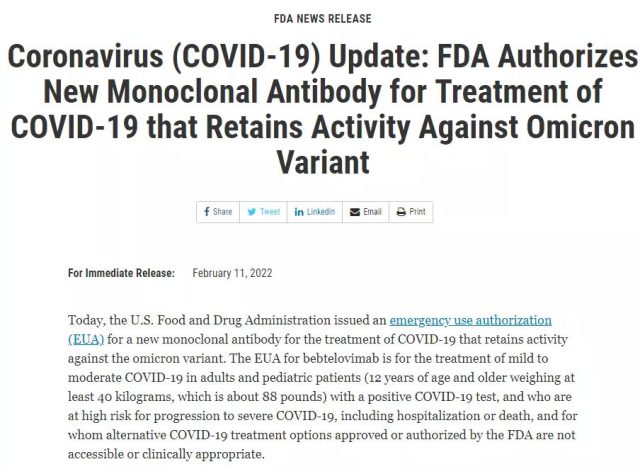Eli Lilly COVID-19 antibody Bebtelovimab received FDA emergency use authorization
- Normal Liver Cells Found to Promote Cancer Metastasis to the Liver
- Nearly 80% Complete Remission: Breakthrough in ADC Anti-Tumor Treatment
- Vaccination Against Common Diseases May Prevent Dementia!
- New Alzheimer’s Disease (AD) Diagnosis and Staging Criteria
- Breakthrough in Alzheimer’s Disease: New Nasal Spray Halts Cognitive Decline by Targeting Toxic Protein
- Can the Tap Water at the Paris Olympics be Drunk Directly?
Eli Lilly COVID-19 antibody Bebtelovimab received FDA emergency use authorization
- Should China be held legally responsible for the US’s $18 trillion COVID losses?
- CT Radiation Exposure Linked to Blood Cancer in Children and Adolescents
- FDA has mandated a top-level black box warning for all marketed CAR-T therapies
- Can people with high blood pressure eat peanuts?
- What is the difference between dopamine and dobutamine?
- How long can the patient live after heart stent surgery?
Eli Lilly COVID-19 antibody Bebtelovimab received FDA emergency use authorization.
Works on Omicron! Eli Lilly’s COVID-19 antibody Bebtelovimab receives FDA emergency use authorization.
On February 11, the U.S. Food and Drug Administration announced the approval of an emergency use authorization (EUA) for Eli Lilly’s COVID-19 neutralizing antibody, Bebtelovimab, for the treatment of mild to moderate COVID-19 in adults and children 12 years and older (at least 40 kg). 19 patients, and those at high risk of developing severe COVID-19.

According to the FDA press release, Bebtelovimab remained active against the Omicron variant. “Today’s authorized approval provides another monoclonal antibody that has demonstrated activity against Omicron as we seek to further increase supply,” said Patrizia Cavazzoni, director of the FDA’s Center for Drug Evaluation and Research. “As new variants of the virus continue to emerge, This authorization is an important step in addressing the need for more treatments.”
Bebtelovimab is a neutralizing IgG1 monoclonal antibody (mAb) against the SARS COV-2 spike protein, maintaining binding and neutralizing activity against all currently known and reported variants, including Omicron and BA.2.
The approval is based on a Phase 2 randomized single-dose clinical trial evaluating bebtelovimab monotherapy and bebtelovimab in combination with other monoclonal antibodies in the treatment of mild to moderate COVID-19.
The placebo-controlled portion of the trial enrolled 380 low-risk patients. In this part of the trial, patients were randomized to a single infusion of bebtelovimab, bebtelovimab with other monoclonal antibodies, or placebo.
Results showed that treatment with bebtelovimab reduced the time to sustained symptom relief compared with placebo. On day 5 after treatment, viral load also decreased compared to placebo.
Another part of the trial involved high-risk individuals. 150 patients were randomized to receive a single injection of bebtelovimab or a single injection of bebtelovimab and other monoclonal antibodies.
An additional 176 high-risk patients received open-label treatment with bebtelovimab and other monoclonal antibodies.
The results showed that among high-risk patients, those receiving bebtelovimab alone or in combination with other monoclonal antibodies had generally lower rates of COVID-19-related hospitalization and mortality by day 29 than previously reported in other monoclonal antibody trials.
It is worth mentioning that on February 10, Eli Lilly and the US government signed an order for 600,000 doses of bebtelovimab, with a total amount of US$720 million (US$1,200 per dose).
The supply agreement calls for delivery of up to 600,000 doses by March 31, 2022, with an option to deliver an additional 500,000 doses by July 31, 2022. In 2022, the projected financial impact of the supply agreement is at least $720 million in revenue and approximately $0.20 in earnings per share.
Eli Lilly COVID-19 antibody Bebtelovimab received FDA emergency use authorization
(source:internet, reference only)
Disclaimer of medicaltrend.org
Important Note: The information provided is for informational purposes only and should not be considered as medical advice.



